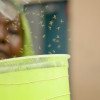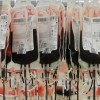Smell testing
Interview with
Smell is a major part of our lives. Here to discuss why we take it for granted is the chair of the Global Consortium for Chemosensory Research and Assistant Director of Monell Chemical Senses Center, Valentina Parma speaking with Naked Scientist Julia Ravey...
Julia - To circle around to what Claire said earlier, I was surprised that the two things she misses before she even mentioned food were her house and her partner. What are the main things that smell is used for that we don't commonly think of?
Valentina - That is a very good question and can be quite common among people who lose their sense of smell or experience distortion to notice these things for the first time. We can really think about the support of eating behavior and nutrition in general. So smell kind of tickles our appetite and allows us to appreciate, as Carl was saying, all of the differences in the foods that we are eating and we are enjoying generally. The second big important function is warning and protection from hazards that we find in the environment. A simple thing that may have happened to most of us: you have a curtain of milk in the fridge but you don't know when exactly you opened it and you use your nose to detect whether it is spoiled or not. And the third one, which may be the most surprising, is social communication. Imagine the odor of your partner, as Claire was saying, it's infused with some positive and familiar sensations of memories. It's a calming effect. But social communication doesn't stop with mating and finding a partner, a good match in the modern world, but it also refers to newborns and mothers and bonding at the very early stages of life. Because we do know that the sense of smell is one of the most functioning senses at birth and even prenatally. It's fully developed in utero.
Julia - Claire also mentioned how depressing it can be. She said to Harry that before the pandemic she was never anxious, but now she's prone to bouts of anxiety. Is that normal? Do a lot of people suffer from that?
Valentina - Yeah, unfortunately it is. When we look at the brain and where the olfactory system is, then we also understand why. The olfactory system is tightly connected with the limbic system and the connection in particular between these olfactory bulbs that I mentioned is linked with depressive symptoms. So when people then tend to have a reduction in the size of the olfactory bulb, they also tend to show more depressive symptoms. We do see in people that improve their levels of depression, their factory abilities also increase back again. So we can see that there is a tight link with, in particular, depression,
Julia - We were wondering, is there any way in which she can improve her mental health?
Valentina - Self-Compassion is a big part of this process. Keep working on your sensory training and keep monitoring your sense of smell so that you can detect like the tiniest changes in the positive direction. Know that you're not alone. There are plenty of other people unfortunately in your situation at the moment, and then give yourself a pat on the back because you're putting a lot of effort in trying to improve this situation that, if you had control over it, you would not be in.
Julia - And just briefly is our ability to smell something that we should be paying closer attention to? And if so, how should we be monitoring it?
Valentina - This is a very good question. Usually we do not think about our smell in our day. We saw this was very important in the COVID 19 pandemic. It took a long time to put the sense of smell among the symptoms to look for. So with colleagues at the Monell Chemical Senses Center in Philadelphia, we developed a rapid test, the SCENTinel, that helps us actually detect very quickly what is the function of different aspects of olfaction? Usually we think “can I identify the odour that I'm smelling?”, but this is not everything that the olfactory system can do for us. We are using SCENTinel with the idea in mind of proposing universal smell testing. I'm pretty sure that all of us, or most of us have been tested for vision, for audition, at least in our lives, but doctors propose to us to do a smell test, to check on our wellbeing and our health. So our idea at Monell is to have a smell test that is rapid. The SCENTinel takes one or two minutes. It's really fast. It's easy to do. People can do it on their own. This can actually help us monitor the changes in our sense of smell. This is going to be very helpful in detecting several diseases down the road.










Comments
Attachment and smell
I wonder how a lifelong significantly impaired ability to smell might make it harder to find a romantic partner or take comfort from them.
Add a comment